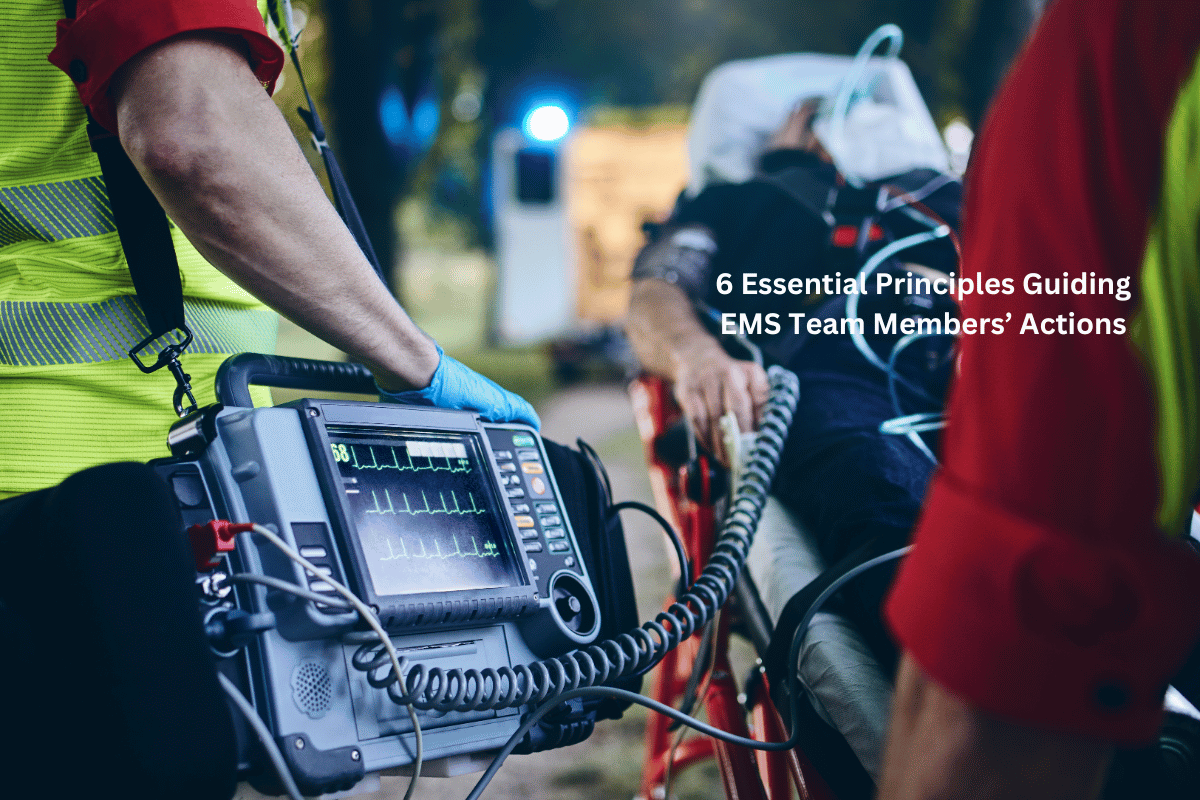6 Essential Principles Guiding EMS Team Members’ Actions
Whether they’re responding to medical emergencies or traumatic injuries, emergency medical service (EMS) professionals are at the forefront, providing rapid and life-saving medical care to individuals in need. EMS encompasses a network of highly trained individuals, including emergency paramedics, medical technicians (EMTs), and other healthcare providers who respond to emergency calls with urgency and expertise. Their primary mission is to assess, treat, and transport patients to appropriate medical facilities while ensuring their safety and well-being throughout the process.
Due to their line of work, EMS teams are often involved in high-stress situations. Nevertheless, they’re still able to deliver prompt, accurate, and empathetic care. Their ability to effectively navigate emergencies and provide critical care hinges on a foundation of protocols and best practices meticulously developed and adhered to by EMS professionals. These guidelines are designed to streamline processes, enhance efficiency, and uphold the highest standards of patient care. In this article, we will explore the essential principles that guide EMS team members’ actions and how they contribute to the remarkable work of EMS teams worldwide.
Strive for Excellence in Clinical Skills
Excellence in clinical skills is crucial for EMS providers, as it directly impacts the quality of care delivered to patients in critical situations. Having proficient clinical skills enables them to assess and treat patients effectively, leading to improved outcomes and increased chances of survival—especially in life-threatening emergencies. That’s why EMS professionals undergo rigorous training to acquire and maintain proficiency in a wide range of medical procedures, including airway management, cardiopulmonary resuscitation (CPR), hemorrhage control, and administering medications. Additionally, demonstrating proficiency in clinical skills instills trust and confidence in patients and their families. This reassures them that patients are in capable hands and are receiving the best possible care during emergencies.
Ensure Clear and Concise Communication with Your Team
Clear and concise communication is essential for conveying critical information, sharing updates on patient status, and coordinating treatment plans among EMS providers. It streamlines workflows and ensures that tasks are performed promptly and accurately, leading to faster response times and improved patient care outcomes. Miscommunication can lead to errors, misunderstandings, and delays in patient care. When EMS providers can communicate effectively, they can minimize the risk of mistakes and ensure that all team members are on the same page regarding treatment plans and protocols. Moreover, effective communication fosters teamwork and collaboration among EMS providers. It enables them to work cohesively towards common goals and adapt quickly to changing situations during emergencies. Additionally, employing an EMS scheduling software can better enhance team communication by helping them organize and manage shifts, ensuring that the right personnel are available at the right times. This also reduces the likelihood of staffing conflicts or shortages during crunch time.
Provide Accurate and Timely Patient Care Reports
EMS providers must adhere to best practices when documenting patient encounters using EMS patient care report software. Protocols such as providing accurate patient information, transport information, and a detailed report of the care administered ensure that the receiving healthcare providers are given relevant information so that they can make informed decisions about further treatment and interventions. Accurate and timely documentation also allows EMS agencies to conduct quality assurance reviews and audits. This allows them to assess the quality and appropriateness of patient care provided and ensure compliance with clinical protocols and guidelines.
Respect the Dignity of Patients
No matter the circumstances or severity of the situation, EMS providers must treat patients with compassion and sensitivity. After all, every patient has the right to be treated with dignity and respect, regardless of their medical condition, socioeconomic status, or background. Being compassionate enables EMS providers to uphold the values of patient-centered care. Furthermore, acknowledging their autonomy and privacy also fosters trust and rapport between EMS providers and patients. When patients feel comfortable with their healthcare providers, they’re more likely to cooperate with EMS professionals and follow their medical advice.
Practice Empathy at All Times
Empathy is a foundational attribute for EMS providers. It gives them the ability to connect with patients on a human level and to better understand their fears, concerns, and needs. Empathy also allows healthcare professionals to recognize and acknowledge the emotional and psychological aspects of the patient experience. This encourages them to have an open and honest dialogue with their patients, as well as provide emotional support and reassurance through the care process.
Prioritize the Well-Being and Comfort of the Patient
Prioritizing the well-being and comfort of patients ensures that care delivery is centered around the individual needs, preferences, and goals of these people. EMS providers must consider the unique circumstances and challenges faced by each patient and tailor their approach to care accordingly, promoting a patient-centered approach to treatment. Adhering to this principle ensures that patients will have a positive experience during medical emergencies. Patients who feel comfortable, supported, and well-cared for during a critical health event are more likely to respond positively to treatment and experience favorable outcomes, including faster recovery times, reduced complications, and increased satisfaction with the care received.
It’s evident that the commitment EMS providers exhibit when adhering to these guiding principles makes a profound difference in the lives of individuals experiencing medical crises. Through their unwavering dedication to patient care, they continue to save lives, alleviate suffering, and promote the well-being of individuals in various communities every day.






